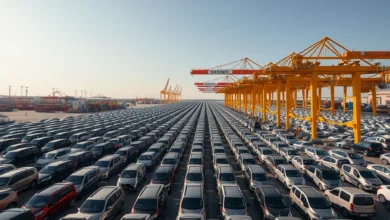
Analyzing the UAE Prefab Buildings Market: Trends and Forecasts
In the fast-evolving landscape of modern construction, prefab buildings stand out as a beacon of innovation and efficiency. Particularly in the United Arab Emirates (UAE), the adoption of these prefabricated structures is reshaping the skyline, offering a blend of sustainability, speed, and cost-effectiveness unlike traditional construction methods. This surge in popularity underscores the importance of analyzing the UAE’s prefab buildings market to understand its current dynamics and future potential. The significance of prefab buildings, encompassing both prefab steel buildings and prefab wood buildings, in contributing to environmentally friendly and economically viable construction solutions, cannot be overstated, signaling a shift towards more sustainable building practices.
The subsequent sections of this article will delve into the market size and share analysis, highlighting the dominant players in the prefab UAE market and the types of prefab buildings gaining traction. A closer look at growth trends will reveal the driving forces behind the market’s expansion and the increasing preference for prefab steel buildings and prefab wood buildings among developers and investors. The competitive landscape section will outline key players and their strategies for navigating the complexities of this market. Furthermore, the future outlook and trends will project the trajectory of the prefab buildings sector in the UAE, offering valuable insights into upcoming innovations and market shifts. This comprehensive analysis aims to equip stakeholders with a deeper understanding of the prefab buildings landscape, enabling informed decision-making and strategic planning for future ventures in this vibrant market.
Market Size and Share Analysis
The UAE prefab buildings market is experiencing significant growth, with various segments showing promising potential. This section provides an analysis of the market size, segmentation, and key players within this evolving landscape.
Market Size in 2024
The UAE prefab wood buildings market is projected to reach a size of USD 296.46 million in 2024. The overall prefabricated building and structural steel market is also substantial, with its size reaching USD 635.0 million in 2023 and expected to grow to USD 1 billion by 2032, reflecting a compound annual growth rate (CAGR) of 5.22% from 2023 to 2032.
Market Segmentation by Application
The UAE prefab wood buildings market is segmented by application into commercial, residential, and other applications. This segmentation indicates a diverse application range, catering to varying needs across different sectors. Similarly, the broader prefabricated building market is categorized based on component and end-use sector, which includes residential, institutional, commercial, and industrial applications.
Major Players and Market Concentration
The market features a mix of local and international players, contributing to a fairly fragmented market landscape. Key players in the UAE manufactured homes market include LINQ, Karmod, Bespoke Modular Solutions, Speed House Group of Companies, and Red Sea International Company. In the prefab wood buildings segment, notable companies include ArchiLine Wooden Houses, Newcastle Factory, and Houses of Wood. These companies are primarily focusing on product launches, mergers and acquisitions, and geographical expansion to enhance their market presence and meet the evolving demands of the sector.
This analysis highlights the dynamic nature of the UAE prefab buildings market, underscoring its growth potential and the strategic moves by major players to capitalize on emerging opportunities.
Growth Trends
Adoption of Prefabrication Methods
The UAE’s prefab buildings market is witnessing significant growth due to the adoption of modular construction methods. These methods not only enhance construction efficiency but also contribute to sustainability. By assembling building components in controlled factory settings, modular construction minimizes on-site waste and improves material utilization. This approach has led to the development of projects like the world’s largest 3D-printed house in Dubai, demonstrating the scalability and effectiveness of advanced prefab technologies in the region.
Development of Smart Cities
Smart city initiatives in the UAE are closely tied to the growth of prefab buildings. The integration of smart technologies and sustainable building practices is pivotal in the development of cities like Dubai and Masdar. For instance, Dubai’s commitment to becoming a leading smart city by 2021 is evident in its strategic adoption of IoTs and smart infrastructure, which are essential components of its urban development. These technologies not only enhance the functionality of prefab buildings but also ensure their adaptability to future needs and environmental sustainability.
Commercial and Residential Projects
The commercial and residential sectors in the UAE are increasingly utilizing prefab construction methods to expedite development and reduce costs. Notable projects include the planned expansion of Ji Hotel by H World International and a significant construction deal between Dubai Municipality and LINQ for a G+6 modular building. These projects highlight the sector’s dynamic growth and the market’s readiness to embrace prefab solutions for both commercial viability and residential convenience. The forecasted growth of the prefab market, with an expected increase in output to AED 36,762.5 million by 2028, underscores the robust expansion and the potential of prefab construction in transforming the UAE’s architectural landscape.
Competitive Landscape
The competitive landscape of the UAE prefab buildings market is characterized by a mix of both local and international players, contributing to a fairly fragmented market environment. Key entities such as LINQ, Karmod, Bespoke Modular Solutions, Speed House Group of Companies, and Al Bait Al Raqi are noteworthy for their strategic initiatives aimed at expanding their market presence.
Profiles of Key Market Players
The market features a variety of significant players including Tata BlueScope Steel, Kirby Building Systems, and Jindal Buildsys Limited, among others. Companies like ArchiLine Wooden Houses and Newcastle Factory are prominent in the prefab wood buildings segment, focusing on niche markets with specialized product offerings.
Recent Developments and Strategies
Recent strategic developments within the sector include the partnership between Red Sea International Company and Samsung C&T for constructing modular accommodation complexes in Abu Dhabi. This USD 14.25 million contract underscores the strategic moves by companies to harness new opportunities and expand their operational scope. Additionally, LINQ announced its next-generation modular homes in February 2022, emphasizing innovation in manufacturing and sustainability, reflecting the industry’s shift towards more environmentally conscious construction practices.
SWOT Analysis
A SWOT analysis of the market reveals:
- Strengths: Strong presence of established players with robust product portfolios and continuous innovation.
- Weaknesses: High competition and fragmentation of the market which could lead to price wars and reduced profitability.
- Opportunities: Increasing demand for sustainable and quick construction solutions presents significant growth opportunities.
- Threats: Economic fluctuations and regulatory changes could impact market dynamics.
These elements together paint a comprehensive picture of the competitive dynamics within the UAE prefab buildings market, highlighting both the challenges and opportunities that shape the strategies of key market players.
Future Outlook and Trends
Government Investment in Construction
The UAE government’s commitment to sustainable construction is evident from its significant investments in the sector. With a budget allocation of AED 2.6 billion ($708 million) for infrastructure and economic resources projects in 2024, the focus is on enhancing the construction landscape. This investment is an 8.3% increase compared to the 2023 budget, reflecting the government’s proactive approach to support the growing demands of the construction industry.
Future Projections and Opportunities
The UAE’s prefab buildings market is poised for substantial growth, with projections indicating an increase in the prefabricated construction output to AED 36,762.5 million by 2028. This growth is supported by both private and public sector investments, including a significant deal signed by Dubai Municipality with LINQ for modular construction. Furthermore, the market is expected to benefit from the increasing adoption of sustainable and green building practices, aligning with the UAE’s goal to achieve net-zero carbon emissions by 2050.
Impact of Global Trends on UAE Market
Global trends in modular construction are significantly influencing the UAE market. The adoption of advanced technologies such as Computer-Aided Design (CAD) and Building Information Modeling (BIM) is enhancing the precision and efficiency of construction. Additionally, the push towards sustainability is driving the adoption of prefab methods that reduce the overall carbon footprint of buildings. The UAE’s strategic partnerships and government initiatives, like the Dubai Clean Energy Strategy 2050, are set to further integrate these global advancements into the local market, enhancing the country’s competitive edge in the construction sector.
Throughout this article, we’ve explored the dynamic and burgeoning market of prefab buildings in the UAE, noting its significant contribution towards sustainable and efficient construction practices. The analysis underscored not just the current market size and segmentation, but also highlighted key players and their strategies, growth trends, and the competitive landscape that together paint a promising future for prefab construction in the region. As we’ve seen, the amalgamation of technological advancements, government initiatives, and strategic market moves are not only transforming the UAE’s skyline but are also setting a benchmark for the global construction industry.
Looking forward, the implications of the UAE’s prefab buildings market extend far beyond national borders, signaling a shift towards more environmentally conscious and technologically driven construction methodologies worldwide. The projected growth and strategic investments in this sector reflect an acknowledgment of the pivotal role prefab buildings play in achieving sustainable development goals. As stakeholders continue to navigate this evolving landscape, the insights provided here will undoubtedly serve as a valuable resource for informed decision-making and strategic planning, ultimately contributing to the broader narrative of global sustainable construction practices.







Thank you for your sharing. I am worried that I lack creative ideas. It is your article that makes me full of hope. Thank you. But, I have a question, can you help me? https://accounts.binance.com/zh-TC/register-person?ref=VDVEQ78S
Your article helped me a lot, is there any more related content? Thanks!